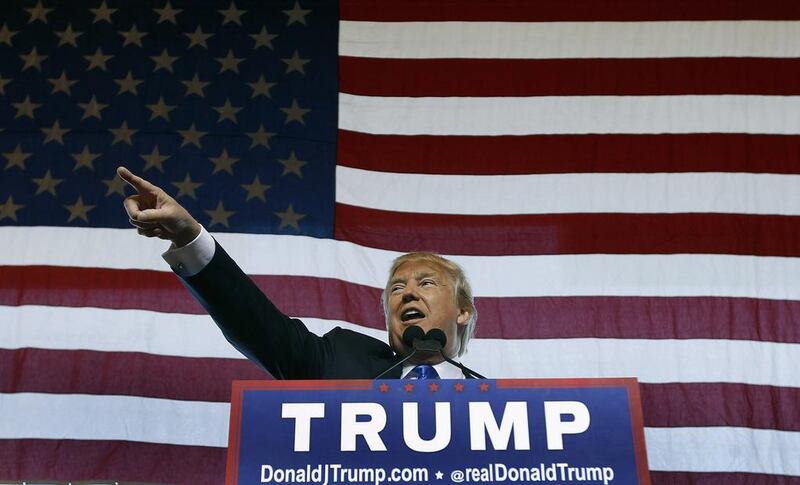Donald Trump and his Republican party colleagues have exposed the depth of the divide in attitudes over the role of American Muslims in US society.
To be clear, fear of Muslims is not just a function of what this or that candidate says, because what they are saying is a reflection of what their supporters believe.
When Republican candidates, for example, maintain that Muslims should not be trusted, that Muslim immigrants be banned, or that Muslims should be profiled, or when candidates pledge to block Syrian refugees entry into the US or claim that the president is a Muslim, they are echoing the views of a majority of Republican party primary voters.
A poll of just over 1,000 voters was conducted by Zogby Analytics in the days after Mr Trump made his comments calling for a ban on Muslim immigrants. It found that Mr Trump continues to hold a big lead over the rest of the field with the support of 38 per cent of probable voters. With 56 per cent of votes, Hillary Clinton maintains a large lead over her rivals in the Democrats camp.
We also asked questions about attitudes towards Arab Americans and Muslims. The results were deeply disturbing, with the overall views of Democrats and Republicans being near mirror reflections of one another.
For example, Democrats had a 51 per cent favourable view of Arab Americans compared with 23 per cent who held unfavourable views. They also had a 44 per cent to 28 per cent net favourable view of American Muslims.
Republican attitudes of Arab Americans were 34 per cent favourable and 44 per cent unfavourable. They also had a 26 per cent to 53 per cent net unfavourable rating for American Muslims.
Similar divergent views were found with regard to whether or not voters felt confident that an elected Arab American or an American Muslim could faithfully carry out their responsibilities. In each case, Democrats agreed that they could, while a majority of Republicans felt that Arab or Muslim Americans would be unduly influenced by their ethnicity or faith.
And the same divide could be found with regards to whether Arab Americans and American Muslims should be profiled or whether Syrian refugees should be admitted to the US.
Six out of 10 GOP voters said that Arab Americans and American Muslims should be screened and the same percentage rejecting the president's goal of accepting 10,000 vetted refugees a year.
The most striking gap occurred in response to the question about the president's religion with only one in 10 Democrats believing that Mr Obama might be Muslim and almost seven in 10 Republicans asserting that he was either a Muslim or had no faith at all.
In each instance, this split masks a deep demographic divide, with older, white, less educated voters making up the largest proportion of Republicans. African-American, Hispanic, younger and more educated voters, meanwhile, make up the Democratic side.
The poll also defined two behavioural characteristics that helped to shape attitudes: sources of news and whether or not a voter knew any Arabs and Muslims. Those who rely on Fox News held largely negative views on all these issues, but the same was also true of CNN viewers. On the other hand, the 30 per cent of voters who rely on other news sources had significantly more favourable views. Similarly, the 30 per cent of all voters who knew Arabs and Muslims had better views of both communities and were more opposed to profiling than the population at large.
As significant as this divide might be, it becomes even more dramatic when we compare the attitudes of supporters of leading candidates. While 53 per cent of Mr Trump’s supporters have negative views of Arab Americans and 68 per cent have negative views of American Muslims, 69 per cent of Mrs Clinton’s supporters have favourable views of Arab Americans and 63 per cent view American Muslims favourably.
Only six per cent of Trump supporters believe Mr Obama is a Christian (60 per cent claim he is a Muslim), while only a handful of Clinton supporters say the president is Muslim, while 74 per cent believe Mr Obama is Christian.
The Zogby poll identifies the magnitude of the problem. It is grave for American Muslims and Arab Americans. Not only that, it is dilemma for the Republican Party and for America – with no easy answers in sight.
In recent weeks, some Republican leaders have denounced Mr Trump's more outrageous positions (though some were careful not to denounce Trump himself).
Senator Lindsey Graham, however, distinguished himself with a full-throated rejection of Mr Trump and his views. Because we are caught up in a horrific situation that we must be relentless in confronting – for our present security and for our future stability – we can only hope that more GOP leaders will follow Mr Graham's example.
Dr James Zogby is the president of the Arab American Institute
On Twitter: @aaiusa





